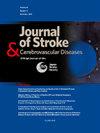小剂量秋水仙碱(一种新近获得美国食品药品管理局批准的预防中风的治疗方法)的效果大小。
IF 2
4区 医学
Q3 NEUROSCIENCES
Journal of Stroke & Cerebrovascular Diseases
Pub Date : 2025-02-01
DOI:10.1016/j.jstrokecerebrovasdis.2024.108186
引用次数: 0
摘要
背景:随着美国食品和药物管理局于2023年6月批准低剂量秋水仙碱用于卒中和其他心血管事件的一级预防,一项针对随机试验卒中结局的最新荟萃分析将有助于为临床实践提供信息。方法:系统的、研究水平的荟萃分析随机临床试验,长期使用秋水仙碱治疗已确诊的动脉粥样硬化性心血管疾病(ASCVD,主要用于卒中一级预防)或非心脏栓塞性缺血性卒中/短暂性缺血性发作(二级预防)的患者。异质性采用I2统计量评估,Cochrane’s Q评估,潜在偏倚采用风险偏倚2.0量表评估。结果:6项随机对照试验符合选择标准,纳入14987例患者(秋水仙碱7495例,安慰剂7492例),中位随访26.3个月。所有试验的秋水仙碱剂量均为0.5 mg,每日一次。在所有试验中,秋水仙碱治疗使卒中的相对风险降低28% (1.77% vs 2.54%,风险比(RR)=0.72, 95%CI: 0.58-0.89;P =0.003),主要不良心血管事件相对减少。亚组间存在潜在的异质性(p相互作用=0.06),5项ASCVD试验中卒中的相对降低更强(RR=0.48, 95%CI:0.30-0.77;p=0.003)高于非心栓塞性缺血性卒中/TIA人群(RR=0.80, 95%CI:0.63-1.02;p = 0.07)。秋水仙碱与全因死亡率的小幅无显著升高相关(RR: 1.09;95%Cl: 0.85-1.40, p=0.49),但无心血管死亡(RR: 0.92;95%Cl: 0.65 ~ 1.29, p=0.61)。结论:低剂量秋水仙碱治疗可降低ASCVD患者和非心栓性缺血性卒中/TIA后患者的卒中和主要不良心血管事件风险。在2年以上的治疗中,每1000名患者中,约有6.6例中风和24例主要不良心血管事件得以避免。本文章由计算机程序翻译,如有差异,请以英文原文为准。
Magnitude of effect of low dose colchicine, a newly food and drug administration approved treatment for stroke prevention
Background
As the Food and Drug Administration in June 2023 approved low dose colchicine for primary prevention of stroke and other cardiovascular events, an updated meta-analysis of stroke outcomes in randomized trials would help inform clinical practice.****
Methods
Systematic, study-level meta-analysis of randomized clinical trials of long-term colchicine in patients with established atherosclerotic cardiovascular disease (ASCVD, preponderantly primary prevention for stroke) or following non-cardioembolic ischemic stroke/transient ischemic attack (secondary prevention). Heterogeneity was assessed with the I2 statistic and Cochrane's Q and potential bias assessed with the Risk of Bias 2.0 scale.
Results
Six randomized control trials met selection criteria, enrolling 14,987 patients (7495 colchicine, 7492 placebo), with median follow-up 26.3 months. Colchicine dosage in all trials was 0.5 mg once-daily. Across all trials, colchicine treatment produced a 28 % relative risk reduction in stroke (1.77 % vs 2.54 %, risk ratio (RR)=0.72, 95 %CI: 0.58-0.89; p = 0.003) and a comparable relative reduction on major adverse cardiovascular events. There was potential heterogeneity by subgroup (pinteraction = 0.06), with a stronger relative reduction for stroke in the five ASCVD trials (RR=0.48, 95 %CI:0.30-0.77; p = 0.003) than the non-cardioembolic ischemic stroke/TIA population (RR=0.80, 95 %CI:0.63-1.02; p = 0.07). Colchicine was associated with a small, non-significant increase in all-cause mortality (RR: 1.09; 95 %Cl: 0.85-1.40, p = 0.49) but not cardiovascular death (RR: 0.92; 95 %Cl: 0.65-1.29, p = 0.61).
Conclusion
Low-dose colchicine treatment decreases stroke and major adverse cardiovascular event risk in patients with ASCVD and potentially in patients following a non-cardioembolic ischemic stroke/TIA. Among every 1000 patients treated over 2 years, approximately 6.6 strokes and 24 major adverse cardiovascular events are avoided.
求助全文
通过发布文献求助,成功后即可免费获取论文全文。
去求助
来源期刊

Journal of Stroke & Cerebrovascular Diseases
Medicine-Surgery
CiteScore
5.00
自引率
4.00%
发文量
583
审稿时长
62 days
期刊介绍:
The Journal of Stroke & Cerebrovascular Diseases publishes original papers on basic and clinical science related to the fields of stroke and cerebrovascular diseases. The Journal also features review articles, controversies, methods and technical notes, selected case reports and other original articles of special nature. Its editorial mission is to focus on prevention and repair of cerebrovascular disease. Clinical papers emphasize medical and surgical aspects of stroke, clinical trials and design, epidemiology, stroke care delivery systems and outcomes, imaging sciences and rehabilitation of stroke. The Journal will be of special interest to specialists involved in caring for patients with cerebrovascular disease, including neurologists, neurosurgeons and cardiologists.
 求助内容:
求助内容: 应助结果提醒方式:
应助结果提醒方式:


